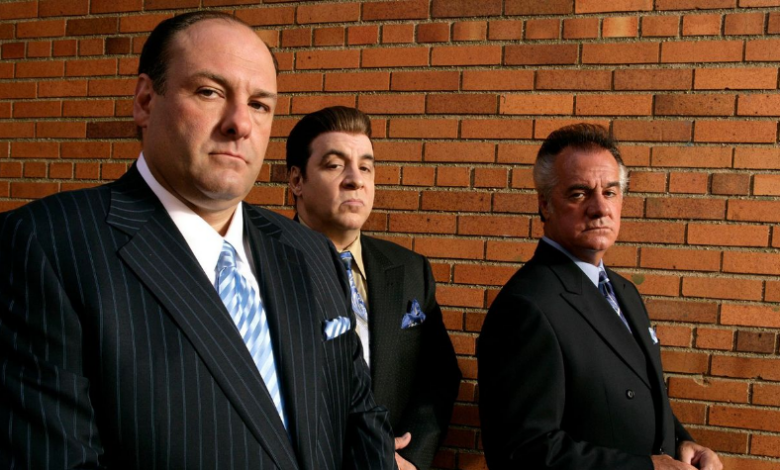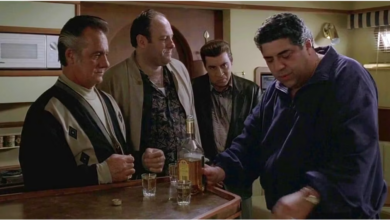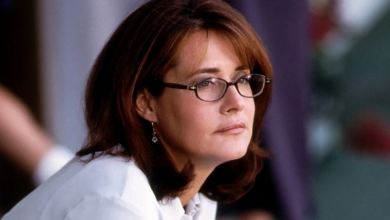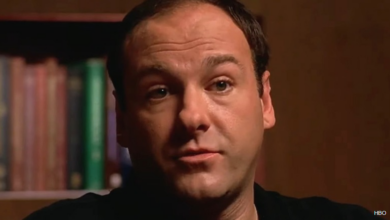How The Sopranos began as a comedy about a mother

Twenty-five years ago this week, the groundbreaking crime drama premiered on HBO in the US. In a 2006 interview, its creator David Chase told the BBC about its very unlikely genesis.
“You need to write about your mother. Your mother is money in the bank.”
So The Sopranos writer and producer David Chase told the BBC’s Mark Lawson about the unlikely inspiration behind his groundbreaking crime drama in an extended 2006 interview.
As he recalled, his wife Denise had long been convinced that his mother was comedy gold, and that other people would see it too. She wasn’t the only one who thought this: colleagues on TV shows he was working on would say the same thing when they heard his stories about her, but he struggled to know how to translate them to the screen. “I thought, ‘why would anybody want to see that? A TV producer with a sort of crazy overbearing mother?’
“I never paid it much thought. Then something made me think that it might be funny to do a story about a guy who was a lot tougher than me. A lot more masculine, tough, savage, all those things, with a mother like that.
“I thought it could be interesting if the guy was a mobster, who puts his mother in a nursing home and she wants to have him killed for that. And, through therapy, he realises that his real enemy in the mob, not only in his life, but in his internal dynamic, is his mother. That would be a good comedy.”
And so began the genesis of one of the most acclaimed TV dramas of all time.
The Sopranos was more than just a crime show; it was a cultural phenomenon. A complex tale of the turbulent life of mob boss Tony Soprano, it depicts a man suffering such debilitating panic attacks from contending with everyday family commitments, the demons from his disturbed childhood and the reality of his brutal and dangerous day job, that he seeks therapy with psychiatrist Jennifer Melfi.
David Chase had been to therapy himself. “I think I was anxious a lot. My mother made everybody anxious,” he said. Although his mother, unlike Tony’s mum Livia, never went as far as to take out a contract on him, she was prone to violent mood swings throughout his childhood and he often felt scared. He remembered once being held back from school due to snow and annoying his mother by complaining about not having an electric organ to play with.
“Finally, she came out of the kitchen with a knife and said, ‘I’d like to stab your eye out!’ And she kind of meant it. So, I was like, ‘Whoa! Ok!’ Not that she ever would have done it.”

In The Sopranos, he used therapy as a framing device to explore, and allow the audience to empathise with, its deeply flawed and morally compromised anti-hero, played by James Gandolfini. It showed him as not just a ruthless mafioso, but as a vulnerable husband and father, in the grip of an existential crisis so acute that, at times, it could make him lose consciousness.
This nuanced portrayal extended to the entire cast. The actors were not merely playing stock characters, a wife, a mother or a mafia henchman designed to move the plot along, but rounded humans with their own internal struggles, motivations and troubles.
The focus on Tony’s subconscious and psyche of its characters allowed the show to embrace non-linear storytelling using flashbacks, hallucinations and dream sequences to examine their inner turmoil, challenging the conventions of traditional television at the time.
This enabled the show to tackle broader themes of mental health, identity, family and power with a layer of realism and depth rarely seen on US TV shows. Its nuanced storytelling meant it was not just a crime drama but a reflection of US society and the complexities of the human condition. The show’s refusal to offer its audiences easy answers or moral resolutions resonated with viewers while at the same time challenging them to confront their own preconceptions and prejudices.
With its cinematic production values and narrative arcs that both engaged audiences and subverted their expectations, it became a huge commercial and critical hit, winning 22 Emmys and five Golden Globes.
Key to the drama’s first two seasons was Livia, played by Nancy Marchand, whose resemblance to Chase’s own mother was confirmed by the rest of his family.
“All my relatives saw it right away… as soon as they saw the show, they went, ‘God, that’s Aunt Norma’,” he said.
It is an, at times, savage portrayal of a mother from hell, who is funny but erratic and vicious. Guilt is a theme that runs throughout The Sopranos but the writer said he did not feel bad about showing his mother in this light.
“I presented this sort of comic view of my mother. I presented it on the air, and she became this beloved character. So, I’ve never felt guilty. Everyone loved Livia. They loved her, just as my wife predicted.
“She was funny, she was outrageous, she said any ridiculous thing that came into her head, and I can’t tell the number of people, the thousands of people, who said, ‘God! My Aunt Mary’s like that!’ ‘My mother’s like that!’ ‘My grandmother’s like that!’ ‘I’ve never seen anything like it. You caught my aunt!’ ‘You caught my mother!’
“So I didn’t feel guilty, because obviously I tapped into something about a certain kind of woman.”




